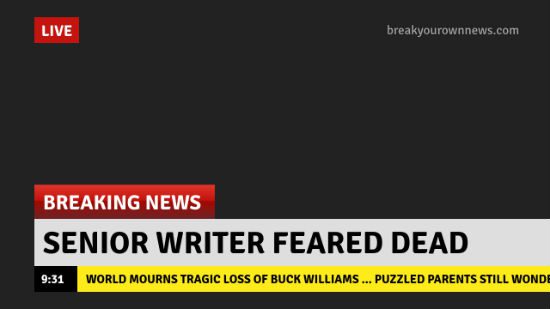Originally posted October 20, 2006.
Read this entire series, for free, via the convenient Left Behind Index. This post is also part of the ebook collection The Anti-Christ Handbook: Volume 1, available on Amazon for just $2.99. Volume 2 of The Anti-Christ Handbook, completing all the posts on the first Left Behind book, is also now available.
Left Behind, pp. 227-228
Buck Williams sat near an exit at JFK Airport reading his own obituary.
As first sentences of chapters go, that’s not bad.
It’d be better, of course, if Buck had done even a half-convincing job of faking his own death — if he hadn’t immediately called his closest relatives to assure them that he wasn’t really dead, and if he weren’t sitting there, in public, out in the open, waiting for his closest friend and work colleague to pick him up at a busy airport.
And it would be better if the article in question really was his obituary, and not an incoherent jumble that reads half like a hastily cobbled obit and half like a news report on the car bombing in which he was supposedly killed. We’re not told what the byline on the article was (or even what the publication is), but it reads like something that would be credited to “Staff and wire reports” — since it combines both domestic and international reporting, some of which must’ve been pulled from international wires and some of which was apparently pulled from some newsweekly trade journal.
Newspaper copy editing is a craft, so if Aristotle was right about the relationship of craftsmanship and virtue, it’s possible that all the copy editors are among the disappeared. But even so, someone at whatever paper Buck is reading should have prevented this wretched article from getting onto the page.
Here’s the first sentence:
Cameron Williams, 30, the youngest senior writer on the staff of any weekly newsmagazine, is feared dead after a mysterious car bombing outside a London pub Saturday night that took the life of a Scotland Yard investigator.
To paraphrase Miracle Max, there’s a big difference between feared dead and all dead. You don’t publish obituaries for people who are only “feared dead” — which means this isn’t an obituary and paragraphs 2, 3 and 4 of this article, summarizing Buck’s life and career, should really be paragraphs 17, 18 and 19, if they’re going to run at all.
But if you think you’re writing an obituary, you need to write it as an obituary, meaning you begin with the most significant facts about the (confirmed) deceased. In the case of Pulitzer Prize-winning journalists like the GIRAT, this means you start out by mentioning that he is a Pulitzer Prize winner. It’s one of the prizes that becomes the first line of any winner’s obituary, as is true for Emmys, Tonys, Grammys, Nobels and Academy Awards, as George Clooney noted earlier this year:
The funny thing about winning an Academy Award, it will always be synonymous with your name from here on in. It will be, “Oscar-winner George Clooney, Sexiest Man Alive, 1997, Batman, died today in a freak accident at a …”
Clooney’s joke worked because he, and his audience, were at least passingly familiar with having read newspaper obituaries (which sometimes refer to “freak accidents,” but do not usually characterize car bombings as “mysterious”). LaHaye and Jenkins, on the other hand, seem never to have read one before.
L&J begin their pseudobituary with a statement about Buck — “the youngest senior writer on the staff of any weekly newsmagazine” — that is A) almost completely meaningless, and B) almost certainly not true (at least not without serious qualifications, “major, national weekly newsmagazine”).
What distinguishes a senior writer from his or her colleagues varies from publication to publication, but it has a lot more to do with the politics of internal staffing assignments than with anything that anyone outside of the staff needs to know or care about. Often such titles are more like what David Mamet wrote of an associate producer’s credit: “It’s what you give to your secretary instead of a raise.”
The title-instead-of-a-raise ploy works best with a certain kind of emotionally needy, thin-skinned employee. These are the kind of people who, once given a title like “senior writer,” will insist that others use it and will correct anyone who fails to do so. (“So you’re a writer for …” “Senior writer. Senior writer!”) L&J’s obsession with Buck’s ceremonial title reminds me of such people. L&J remind me of such people.

The pseudobit gives us two more paragraphs summarizing Buck’s career, neither of which offers the reader much sense of why they should care about this man’s feared passing. There’s little specific reference to Buck’s specific writing, no quotes from other prominent journalists to offer a sense of how he was regarded by his peers. It reads, instead, like something Buck himself would have written if he was feeling particularly petulant, slighted and underappreciated:
Williams, a five-year employee of Global Weekly, had won a Pulitzer [sic] as a reporter for the Boston Globe before joining the magazine as a staff reporter at 25. He quickly rose to the position of senior writer and has since written more than three dozen cover stories, four times assigned the Weekly’s Newsmaker of the Year story.
Pop-quiz: Do you know who wrote any of Time’s “Man of the Year” stories? Do you care? Have you ever heard anyone remark on such an assignment as a particularly notable and prestigious example of top-tier journalism? Me neither.
This odd preoccupation with inside baseball and corporate milestones reads more like something from a “staff bios” Web page than like an obituary. I’d guess that was where the pseudobit writer lifted it from, except that wouldn’t account for the errors, such as the first-reference use of “Pulitzer” without “Prize” and the failure to mention what category the prize was for (there are more than a dozen for journalists, and others for drama, fiction, music, history, poetry …) or what article or articles the prize recognized.
The journalist won the prestigious Ernest Hemingway Prize for war correspondence when he chronicled the destruction of the Russian air force over Israel 14 months ago. According to Steve Plank, executive editor of Global Weekly, the administration of the magazine is refusing to confirm the report of Williams’s death “until we see hard evidence.”
That second sentence, the one that really ought to be a new paragraph since it represents a jarringly new thought, is particularly strange. It tells us that the writer got on the phone to attempt to confirm Buck’s death. The writer managed to get in touch with Plank, getting only an evasive partial quote that offered a non-denial non-confirmation as to whether or not the subject of this obituary is even really dead to begin with. Then, deciding to go ahead with the obit anyway, the writer doesn’t bother to ask Plank anything about the character or accomplishments of his possibly deceased colleague.
This also tells us a thing or two about Steve Plank. The reporter may not have asked, but he still could have offered some praise of his friend — seizing the chance to say something like that eulogy in Waking Ned Devine. But maybe he was just too pressed for time, since while he was talking with this reporter he was also apparently on the other line, talking with Buck and arranging to pick him up at the airport the next day. That raises an ethical question about Plank’s comment. He either already knew, or at least suspected, that Buck wasn’t dead, yet when asked a direct question, he gives a deceptive answer. Joe Klein — a senior writer for a weekly newsmagazine — got in hot water a few years back for that very thing. If you can’t give an honest answer to such a direct question, then you avoid having to answer it. You don’t answer the phone and remain “unavailable for comment.” It’s been less than 24-hours since the first reports of Buck’s demise and Steve’s inability to stall and stonewall for even one news cycle suggests that he’s utterly unqualified for the position he later accepts as Antichrist press secretary.
Williams’s father and a married brother reside in Tucson, where Williams lost his sister-in-law, niece and nephew in last week’s* disappearances.
Oh, right. The disappearances.
It’s easy to forget, as our authors frequently do, that all this is happening in the context of those disappearances — which happened just six days ago. It’s not just Buck who is missing and “feared dead,” then, it’s Buck and 2 billion other people, including every child on the now-childless planet. Not to mention the thousands of still-untallied dead in the following days from the hundreds of plane crashes and other related disasters.
If the newspaper has decided to run obituaries for all those “feared dead,” then I can imagine there’d be a bit of a backlog. But with the line between “confirmed” and “feared” dead for the missing so utterly, indecipherably blurred, I’d also imagine newspapers would have to take a different approach.
Post-event there would be a new special section listing the prominent people suspected to be among the disappeared. I’d highlight a different segment of the population each day — locals, political leaders, entertainers, athletes, academics and authors, etc. — with brief capsule bios as space allowed. This special section wouldn’t only include the names of the famous and prominent, of course, there would also be the lists — long alphabetical lists in agate type, phonebook-style rolls of the missing. (After a few days’ worth of such special sections, I’d expect the editors, and their readers, to begin discerning some patterns — “Hmm, this list of evangelical types is really long …” — but that’s another issue.)
It would take days, maybe even weeks, before all the names in these listings could be confirmed as among the disappeared or the dead, and I rather doubt any New York paper would be able to report with confidence, five days after the event, on the disposition of all of Buck’s in-laws, nieces and nephews.
There’d be another new special section in newspapers, one with the photographs and phone numbers submitted by readers. The desperate, heart-breaking “Have you seen …?” section.
Charging for the placement of such photos would be very lucrative, but probably too sleazy even for the godless left behinders now in charge. For PR reasons, I’d guess they would run short, name-and-number, classified-ad type listings for free, with the option of adding a photo for an additional fee. Such fees would pay for all those extra pages. As would the ad revenue from all the new businesses springing up post-event to cash in: the private investigators, grief-counselors, quasi-religious gurus and other snake-oil salesmen pitching ways to get your children back or to protect yourself from the coming second wave of disappearances, which might strike at any time.
With all that extra work to do, it seems unlikely that anybody at the paper would be fine-toothing the international wires and clipping stories about car bombings that may have killed journalists and police officers on another continent.
Jenkins wrote a syndicated daily comic strip for several years (“Gil Thorp” — not funny), so he ought to have been around the newspaper business enough to realize all of the above. Not that you’d have to have such experience to realize such things — they are obvious to anyone who’s ever read a newspaper.
Maybe Jenkins and LaHaye never have. That would explain a great deal.
– – – – – – – – – – – –
* Oops. The one good thing about Rayford’s going to church on Sunday was that it allows us to finally figure out what day it is. And this being Sunday, the disappearances that occurred six days (or is it five?) earlier did, indeed, occur “last week.” And even though — as best as I can decipher from the book’s muddled chronology — the bombing in which Buck was suspected killed occurred in the same week as those disappearances, the report is written to appear in Sunday’s paper, so again L&J’s use of “last week’s disappearances” was the one thing they got right in this pseudobituary and shouldn’t have had the “[sic]” — “last week’s [sic] disappearances” — I initially put there. My bad.
















